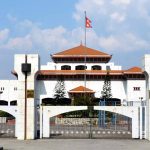
The House of Representatives has passed the “Nepal Citizenship (Second Amendment) Bill, 2082” with a majority vote during Saturday’s session.
Home Minister Ramesh Lekhak presented the proposal to pass the bill, following his earlier motion to discuss the bill along with the report from the State Affairs and Good Governance Committee.
While presenting the proposal, Minister Lekhak stated that the bill ensures the right to acquire citizenship through the mother’s name for children born to Nepali mothers.
“This bill has been brought to guarantee citizenship through the mother’s name. It also aims to implement court verdicts on citizenship issued at different times,” said Lekhak.
He clarified that this will prevent the risk of statelessness among children born abroad to Nepali women working overseas. According to the bill, individuals born abroad to Nepali mothers who reside in Nepal, do not possess foreign citizenship or passports, and whose father’s identity is unknown, can acquire naturalized Nepali citizenship through self-declaration as per legal provisions.
Additionally, the bill introduces a provision to issue a “minor identity card” to children under 16 years of age if either parent holds Nepali citizenship.
During the deliberations, lawmaker Prakash Jwala expressed hope that the bill’s enactment would pave the way for granting citizenship through the mother’s name. He emphasized the bill’s role in ensuring genuine citizens are not deprived of their rights, while preventing non-citizens from gaining citizenship under any circumstances.
MP Jwalakumari Sah stated that the law is essential to safeguard national security, unity, and sovereignty. She highlighted that children of Nepali women married to foreign nationals can now obtain citizenship through their mother, eliminating the risk of statelessness.
Similarly, MP Prem Suwal pointed out the recurring citizenship challenges in border areas and called for clarity in the law. While supportive of granting citizenship through the mother, he also stressed the importance of establishing the father’s identity where possible.
MP Ramkrishna Yadav mentioned that the bill’s implementation would help resolve many citizenship-related issues, particularly in the Terai region. He noted that stateless individuals often face denial of state services, and this bill could address such problems.
MP Ranjukumari Jha highlighted that the bill was designed to enforce a Supreme Court precedent allowing citizenship through the mother’s name.
However, MP Chitra Bahadur KC voiced concern that, despite lengthy discussions in parliament, the bill may not fully resolve citizenship-related issues arising from Nepal’s open border with India.
Several lawmakers, including Rupa Soshi Chaudhary, Sher Bahadur Kunwar, Madhav Sapkota, Muktakumari Yadav, Narayani Sharma, Purna Bahadur Gharti, Bhagawati Chaudhary, Amrit Lal Rajbanshi, Kantika Sejuwal, Sushila Thing, and Amritadevi Agrahari shared their views during the session.










